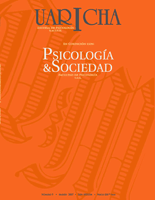La ciencia paradigmática
Contenido principal del artículo
Resumen
El presente escrito girará en torno a la propuesta filosófica de T. S. Kuhn, particularmente en el tema del paradigma; el problema lo podemos definir de la siguiente manera: ¿cuál es la importancia del paradigma en las revoluciones científicas, y éstas qué papel juegan en la críticas al considerar a la historia como un continuo progreso? La hipótesis es: el paradigma es situado como la génesis de toda revolución científica, cuando se acepta la participación del paradigma en la revolución científica evidentemente se hace referencia a la historia, donde no podemos considerarla como un destino absoluto, contemplándose lo cambiante de la misma.
Detalles del artículo
Sección

Esta obra está bajo una licencia internacional Creative Commons Atribución-NoComercial-SinDerivadas 4.0.
Los autores tienen el derecho de propiedad o copyright y ceden a Uaricha Revista de Psicología el derecho a publicar por primera vez el artículo, así como a divulgarlo y distribuirlo en los medios tecnológicamente disponibles y a través de repositorios.
Uaricha Revista de Psicología, es una publicación anual editada por la Facultad de Psicología de la Universidad Michoacana de San Nicolás de Hidalgo, Calle Francisco Villa No. 450, Col. Dr. Miguel Silva, Morelia, Michoacán, C. P. 58110. Teléfono (+52) 443 312 9909, ext. 149, www.revistauaricha.umich.mx, uaricha.publicaciones@umich.mx. Editora responsable: Dra. María Elena Rivera Heredia. Reserva de Derechos al Uso Exclusivo No. 04-2013-070413365500-203, e-ISSN: 2007-7343, otorgados por el Instituto Nacional del Derecho de Autor. Responsable de la última actualización de este Número, Centro de Cómputo de la Facultad de Psicología, Ing. Erick Vidar Alva Rangel.
Cómo citar
Referencias
KUNH, T. S. (1991). La Estructura de las revoluciones científicas. México. F.C.E.
KUNH, T. S. (1989). ¿Qué son las revoluciones científicas y otros ensayos? España: Paidós.
OLIVÉ, León y PÉREZ RANSANZ, Ana Rosa (1999). Filosofía de la ciencia: teoría y observación. México: Siglo XXI – UNAM.
VILLORO, L. (1998) Creer, saber, conocer. México: Siglo XXI.

